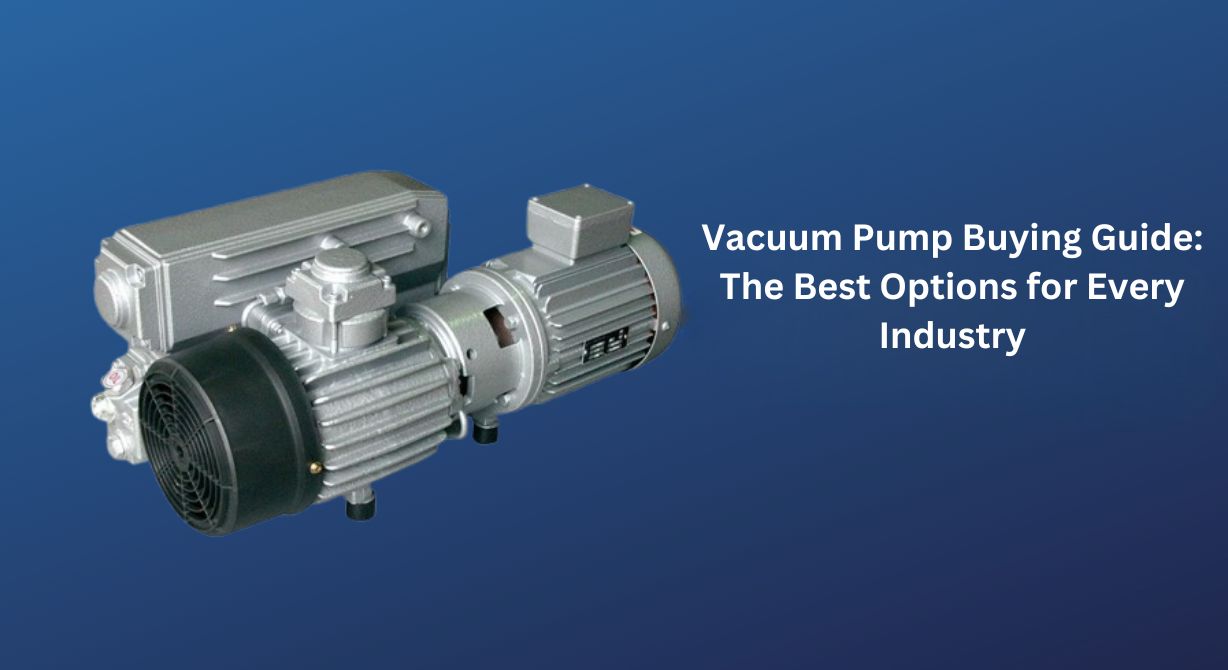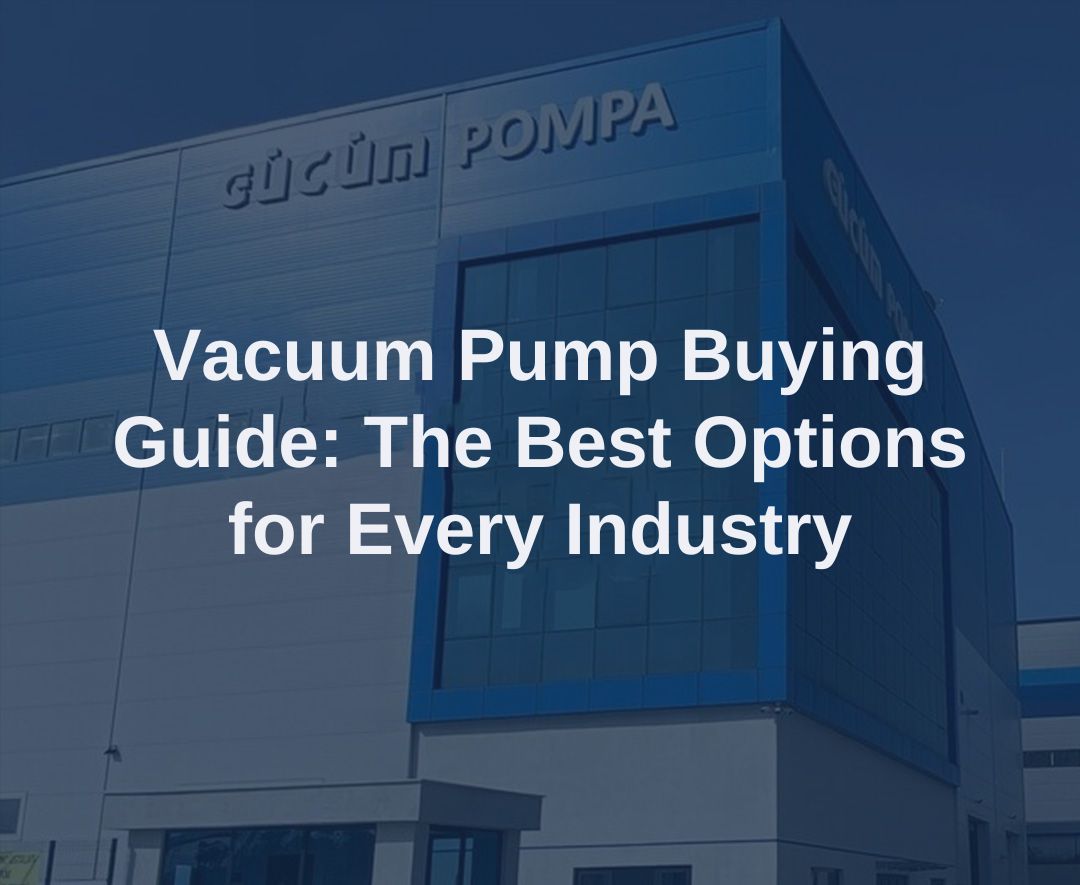Vacuum Pump Buying Guide: The Best Options for Every Industry
Table of Contents
- Which Vacuum Pump is More Advantageous for Your Industry?
- What Features Should You Pay the Most Attention to When Choosing a Vacuum Pump?
- Cheap or Efficient? What Really Matters When Buying a Vacuum Pump?
- Common Mistakes When Buying a Vacuum Pump and Correct Selection Methods
- Classic Vacuum Pumps vs. Smart Vacuum Pumps: Which is More Profitable?
- Step-by-Step Guide to Choosing the Most Suitable Vacuum Pump for Your Industry
Which Vacuum Pump is More Advantageous for Your Industry?
When selecting a vacuum pump, the needs of your industry are the determining factor. Different industries require different types of vacuum pumps and features. For example, oil-free vacuum pumps are preferred in the medical and food sectors due to the need for clean operating conditions and minimal contamination risk.
In heavy industry and chemical sectors, oil-based vacuum pumps are generally used. These pumps provide high performance and durability and are more resistant to high temperatures and harsh working conditions.
Energy efficiency is an important criterion in every industry. Especially in systems that operate continuously, low energy consumption significantly reduces operating costs. Therefore, energy-saving models suitable for sectoral efficiency needs should be preferred.
Additionally, ease of maintenance and availability of spare parts can vary depending on the sector. In industries where operational continuity is critical, quick service and technical support are prioritized.
Ultimately, choosing the right vacuum pump according to your industry's requirements provides advantages in both performance and cost.
What Features Should You Pay the Most Attention to When Choosing a Vacuum Pump?
Choosing a vacuum pump requires considering many critical factors for efficient and trouble-free operation. First, the vacuum pump capacity must suit your needs. Capacity is directly linked to your process volume and vacuum level; incorrect capacity choice leads to performance drop and energy waste.
Paying attention to the pump type is also very important. Oil-based and oil-free vacuum pumps serve different applications. Oil-free pumps are preferred in sensitive applications, while oil-based models are more durable in heavy industrial uses.
Energy efficiency should also be among selection criteria. Low energy consumption reduces operating costs in the long term and lessens environmental impact. At the same time, noise level is important; quiet pumps improve the working environment comfort.
Ease of maintenance and availability of spare parts affect your choice. Easy maintenance shortens downtime and lowers total cost. Also, durable materials extend the pump's lifespan.
Finally, the price-performance balance of the pump should be well analyzed. While cheap options may seem attractive, products that provide high efficiency and durability are more advantageous in the long run.
Cheap or Efficient? What Really Matters When Buying a Vacuum Pump?
Many people prioritize price when buying a vacuum pump. However, a cheap vacuum pump does not always mean a good investment. Low-cost products may initially ease your budget but can lead to high energy consumption, frequent failures, and insufficient performance in the long term, costing you more. Therefore, efficiency should always be prioritized.
High energy efficiency pumps provide significant savings during operation. Low energy consumption is not only environmentally friendly but also reduces operational expenses. Additionally, factors such as pump durability and ease of maintenance impact long-term costs and operational continuity.
Selecting a pump that fits your application needs is also critical. Choosing a vacuum pump with unnecessarily large or small capacity causes energy and performance issues. Thus, choosing the right pump type and capacity is a smart investment for both efficiency and cost.
Noise level should not be ignored either. Pumps with high decibel levels degrade workplace quality and pose occupational health risks. Therefore, quiet models improve your work environment comfort.
In conclusion, price and efficiency balance is the most critical criterion when selecting a vacuum pump. Although focusing solely on cheap products may seem tempting short-term, efficiency-focused decisions are necessary for sustainability and long-lasting performance.

Common Mistakes When Buying a Vacuum Pump and Correct Selection Methods
The most common mistake when buying a vacuum pump is miscalculating the pump capacity needed. If a pump that is too small is chosen, the system works inefficiently; if too large, it wastes energy unnecessarily. Therefore, determining the required vacuum level and volume accurately is critical.
Another common mistake is choosing the pump type unsuited to the application. For example, oil-free models are preferred for sensitive and clean applications, while oil-based pumps are better for high-capacity industrial operations. Wrong type choice directly affects pump performance and lifespan.
Energy consumption and noise level are other often overlooked important factors. High energy-consuming or excessively noisy pump models increase operating costs and negatively affect the working environment.
Ease of maintenance and spare part availability should also not be neglected. Brands with a wide service network and quick technical support prevent time loss during possible failures and ensure uninterrupted operation.
For correct selection, first clarify your usage purpose, compare vacuum pump performance and technical specifications. Getting detailed information from the seller and, if possible, reviewing reference user experiences will help you make the right decision.
Classic Vacuum Pumps vs. Smart Vacuum Pumps: Which is More Profitable?
Classic vacuum pumps have been robust and proven systems preferred in industry for many years. However, with technological advances, smart vacuum pumps have gained significant ground in the sector. Classic pumps typically operate at fixed speeds and meet basic vacuum needs. In contrast, smart pumps are equipped with sensors, continuously monitoring operating conditions and making automatic adjustments.
At first glance, classic pumps may seem attractive due to their lower cost. However, smart pumps can be much more profitable in the long run due to advantages in energy efficiency and maintenance costs. Especially in applications with variable workloads, smart systems make a significant difference with performance optimization and energy savings.
Maintenance times are also shorter for smart vacuum pumps thanks to remote monitoring and fault detection features. This is critically important for preventing production interruptions and ensuring operational continuity.
However, the simple structure and ease of repair of classic pumps can be an advantage for some businesses. Still, considering technological advances, smart vacuum pumps offer more sustainable and economical solutions.
In conclusion, the decision should be made based on investment budget and application needs. Classic pumps offer short-term cost advantages, while smart vacuum pumps provide long-term savings and performance.
Step-by-Step Guide to Choosing the Most Suitable Vacuum Pump for Your Industry
Choosing a vacuum pump starts with determining the right device according to your industry's needs. The first step is to clarify your operating area's vacuum level and capacity requirements. These values are fundamental criteria for efficient pump operation.
The second step is selecting the pump type considering sectoral conditions. For example, oil-free vacuum pumps are generally preferred in medical and food sectors, while oil-based pumps are more common in heavy industrial applications.
The third step is evaluating energy consumption and maintenance requirements. Models with low energy consumption and easy maintenance reduce operating costs and extend usage duration.
Finally, factors like noise level and service support also play a role in the selection. Quiet pumps improve the working environment, and a wide service network enables fast intervention in case of problems.
Following all these steps to choose the most suitable vacuum pump for your industry increases your efficiency and reduces costs in the long run.


